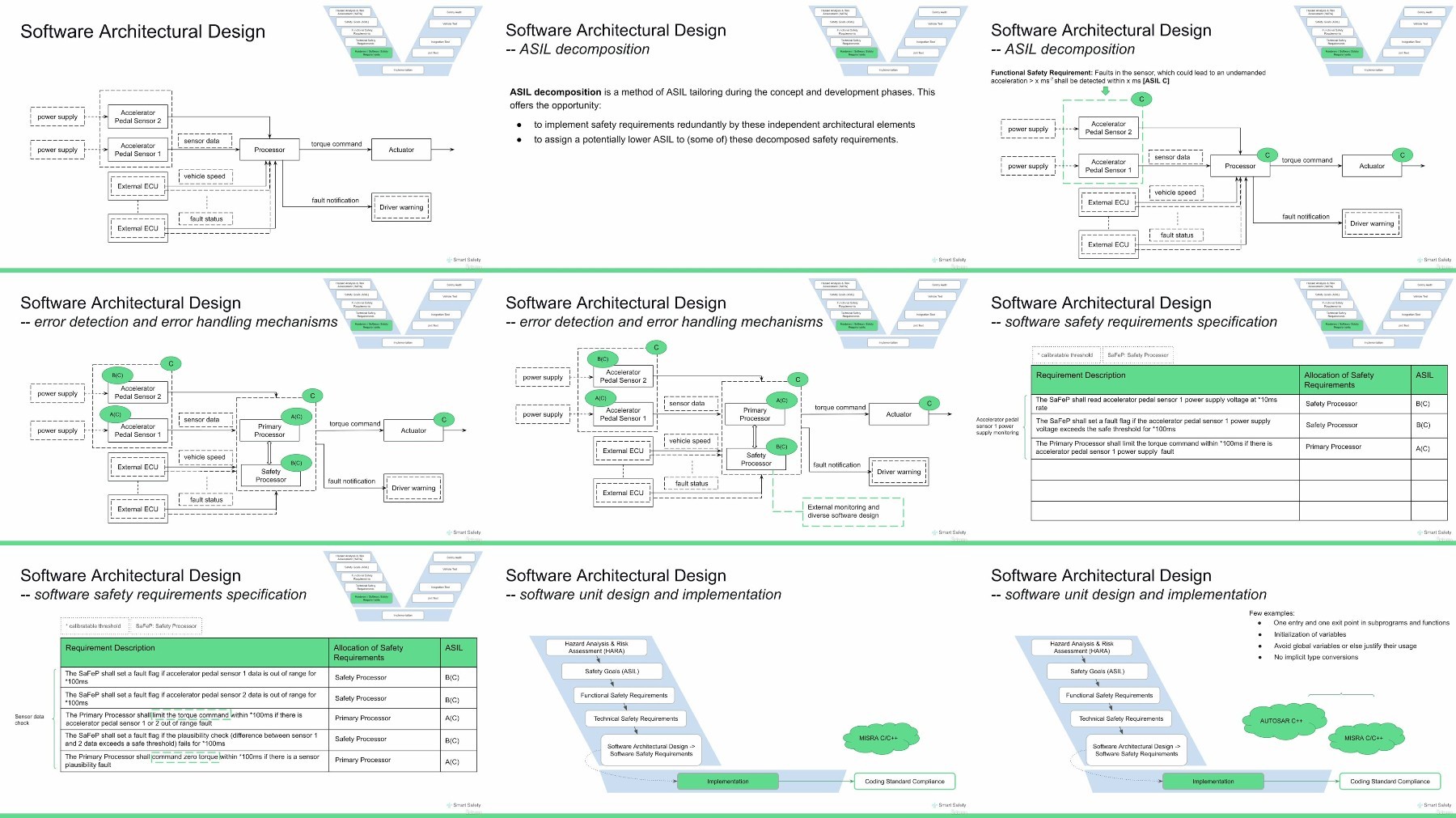Automotive Software Functional Safety - ISO 26262

Automotive Software Functional Safety - ISO 26262
Published 7/2024
Duration: 1h10m | .MP4 1280x720, 30 fps(r) | AAC, 44100 Hz, 2ch | 317 MB
Genre: eLearning | Language: English
Become an expert in software functional safety using ISO 26262. Learn all stages of the V-shape model with examples
What you'll learn
Understand the basics of automotive functional safety
Understand the why of developing safe automobiles
Understand the basics of ISO26262 software safety
Master the concept of Hazard Analysis and Risk Assessment (HARA) with real-world examples
Master the concept of Automotive Safety Integrity Level (ASIL)
Learn about Functional Safety
Requirements and how to derive them
Learn about Technical Safety
Requirements and how to derive them
Master concepts of Software Architectural Design including error detection and handling mechanisms with real-world examples
Learn how to derive Software Safety
Requirements (SSRs) with real-world examples
Master concepts of Verification & Validation including Static Analysis, Integration Testing and Vehicle Testing with examples
Overview of the V-Shape model
Learn about traceability
Learn about Configuration and Change Management
Learn about Software Tool Qualification
Requirements
Basic understanding of software
Description
Unlock your engineering career with this comprehensive Automotive Software Functional Safety course! This course is perfect for both aspiring professionals, seasoned engineers and students. This course dives deep into essential software safety aspects in the automotive industry, using real-world examples and the V-shaped model process.
Key Learning Areas:
Hazard Analysis and Risk Assessment (HARA):
Identify potential hazards and assess associated risks in automotive systems.
Automotive Safety Integrity Levels (ASIL):
Classify risk levels and determine the appropriate ASIL for different components.
Functional Safety
Requirements (FSRs), Technical Safety
Requirements (TSRs), and Software Safety
Requirements (SSRs):
Define and manage safety requirements throughout the development lifecycle.
Error Detection and Handling:
Learn techniques to detect, manage, and mitigate errors, ensuring system reliability and safety.
Verification and Validation (V&V):
Master processes to ensure your automotive software meets all safety and functional requirements.
Supporting Processes:
Explore traceability and change management to maintain control over the development process and manage modifications efficiently.
Why Enroll:
Real-World Applications:
Learn through examples that mirror actual industry practices and challenges.
In-Depth Knowledge:
Cover all essential topics for a thorough software safety analysis, becoming an expert in the field.
Career Advancement:
Equip yourself with the skills to excel in job interviews or upskill at your current job, setting you apart amongst your peers
Unique Learning Opportunity:
Gain knowledge not typically covered in traditional engineering courses, making you a valuable asset to any team.
By the end of this course, you'll understand automotive software safety, ready to tackle real-world challenges and advance your career.
Who this course is for:
Automobile Engineering Students
Automotive Software Engineers
Functional Safety Engineers
Automotive Software Safety Engineers
Automotive Systems Engineers and Designers
Automotive Test Engineers
More Info

What you'll learn
Understand the basics of automotive functional safety
Understand the why of developing safe automobiles
Understand the basics of ISO26262 software safety
Master the concept of Hazard Analysis and Risk Assessment (HARA) with real-world examples
Master the concept of Automotive Safety Integrity Level (ASIL)
Learn about Functional Safety
Requirements and how to derive them
Learn about Technical Safety
Requirements and how to derive them
Master concepts of Software Architectural Design including error detection and handling mechanisms with real-world examples
Learn how to derive Software Safety
Requirements (SSRs) with real-world examples
Master concepts of Verification & Validation including Static Analysis, Integration Testing and Vehicle Testing with examples
Overview of the V-Shape model
Learn about traceability
Learn about Configuration and Change Management
Learn about Software Tool Qualification
Requirements
Basic understanding of software
Description
Unlock your engineering career with this comprehensive Automotive Software Functional Safety course! This course is perfect for both aspiring professionals, seasoned engineers and students. This course dives deep into essential software safety aspects in the automotive industry, using real-world examples and the V-shaped model process.
Key Learning Areas:
Hazard Analysis and Risk Assessment (HARA):
Identify potential hazards and assess associated risks in automotive systems.
Automotive Safety Integrity Levels (ASIL):
Classify risk levels and determine the appropriate ASIL for different components.
Functional Safety
Requirements (FSRs), Technical Safety
Requirements (TSRs), and Software Safety
Requirements (SSRs):
Define and manage safety requirements throughout the development lifecycle.
Error Detection and Handling:
Learn techniques to detect, manage, and mitigate errors, ensuring system reliability and safety.
Verification and Validation (V&V):
Master processes to ensure your automotive software meets all safety and functional requirements.
Supporting Processes:
Explore traceability and change management to maintain control over the development process and manage modifications efficiently.
Why Enroll:
Real-World Applications:
Learn through examples that mirror actual industry practices and challenges.
In-Depth Knowledge:
Cover all essential topics for a thorough software safety analysis, becoming an expert in the field.
Career Advancement:
Equip yourself with the skills to excel in job interviews or upskill at your current job, setting you apart amongst your peers
Unique Learning Opportunity:
Gain knowledge not typically covered in traditional engineering courses, making you a valuable asset to any team.
By the end of this course, you'll understand automotive software safety, ready to tackle real-world challenges and advance your career.
Who this course is for:
Automobile Engineering Students
Automotive Software Engineers
Functional Safety Engineers
Automotive Software Safety Engineers
Automotive Systems Engineers and Designers
Automotive Test Engineers
More Info

